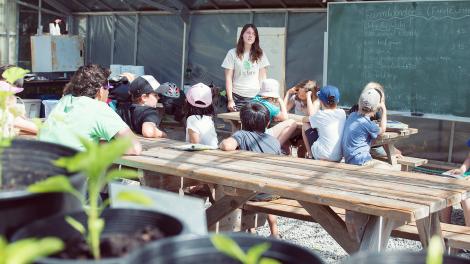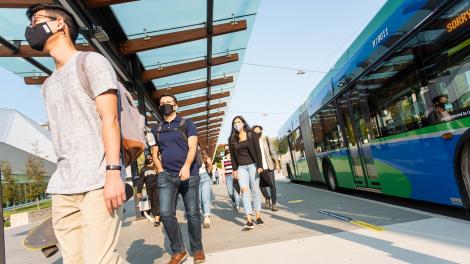UBC has a shared vision of creating campus communities where health and wellbeing for all is championed and supported. Guided by the Okanagan Charter, students, faculty, staff and community members across the university work together to advance Wellbeing Strategic Framework priority areas and targets, with one focus being mental health and resilience. Mental health and resilience is foundational to individual and community wellbeing as it underpins our capacity for academic learning as well as our ability to fully contribute in the workplace.
There is a complex interplay between the individual, social, relational, and environmental factors that impact mental health, both positively and negatively. Our health promotion approach should not only include service provision and equipping our community with skills to live well, but also recognize and challenge the structures and systems that can exacerbate health challenges both on and off campus.
MENTAL HEALTH AND RESILIENCE TARGETS
10%
increase in community members
who feel mental health is a UBC priority by 2025
10%
increase in community members
reporting access to opportunities
to develop mental health literacy by 2025
Making Mental Health a Priority
This dataset from the Canadian Campus Wellbeing Survey run on both UBC Vancouver and Okanagan campuses shows that in 2021: 20-39% of students and 26-53% of staff, faculty, and postdocs agreed or strongly agreed that mental health is a priority at UBC. For students, where we have two periods of data, there was a decline of between 6-17% compared to 2019 (pre-COVID pandemic).
We recognize that workplace and learning environments can impact our mental health when they perpetuate social and systemic inequities that increase stress, reduce engagement, increase absenteeism, and lower our ability to be well and flourish. It is therefore vital to consider settings and environments and take collaborative steps to promote positive mental health for students, faculty and staff.
Recent actions include VP Human Resources launching a new 30-minute required training program in January 2023: Supporting Mental Health in the Workplace for Managers and Supervisors. In recent years, the VP Students portfolio has implemented a Stepped Care model to improve the effectiveness of mental health services and supports. The AVP Students’ portfolio in the Okanagan is taking important steps to decolonize health and social services across Student Wellness.
Advancing mental health literacy
UBC’s health-promotion approach to mental health and resilience is about equipping our community with the skills and knowledge they need to live well and improve their health as well as fostering supportive environments. While mental health challenges impact us all, these challenges are compounded for those also experiencing stigma and discrimination as a result of intersecting identities1,2,3. Intersectional approaches to mental health are critical to supporting historically, persistently and systemically marginalized populations.
Increasing and diversifying information systems remains an area of opportunity to improve student help-seeking efficacy. 2021 data indicates that 34-47% of students know where to access campus-based resources for their mental or emotional health; a -10 to +1% change from 2019. 31-42% of students know where to access off-campus resources, a 2-8% improvement from 2019. In 2021, the baseline year for this data, 51-57% of staff, faculty, and postdocs had reported some familiarity with UBC resources available to them. Further, 43-56% reported an ability to handle the day-to-day demands of life and 30-51% said the UBC campus climate encourages an open discussion of mental health.
UBC’s holistic focus and commitment to faculty and staff wellbeing was recognised by Excellence Canada with Gold certification for the Mental Health at Work® Framework through an external benchmark assessment highlighting the Employee and Family Assistance Program and extended health plan, the Healthy Workplace Initiatives Fund, and Thrive.
1Berger, Michele, and Kathleen Guidroz, eds. 2009. The Intersectional Approach: Transforming the Academy through Race, Class, & Gender. Chapel Hill: University of North Carolina Press.
2Collins, Patricia Hill, and Sirma Bilge. 2016. Intersectionality. Key Concepts. Cambridge, UK: Polity. 88–113
3Dill, Bonnie Tornton, and Ruth Zambrana, eds. 2009. Emerging Intersections: Race, Class, and Gender in Theory, Policy, and Practice. New Brunswick, NJ: Rutgers University Press.
Current Performance
Related plans and reports

Wellbeing Strategic Framework
A shared vision for UBC as a health-and-wellbeing- promoting university where all people, places and communities can flourish.

Okanagan Charter
An international Charter providing institutions with calls to action, principles and framework to become a health and wellbeing promoting university.

UBC Student Strategic Plan
The first step to supporting all UBC students in their academic journey and beyond. UBC promotes social justice and wellbeing by infusing inclusion, health and sustainability into all aspects of the university experience.

UBC Focus on People 2025
The Focus on People 2025 framework speaks to how the university intends to be a first-choice place for faculty and staff to meet their greatest potential.
Featured Datasets
Here are some of the datasets available for Wellbeing from our online sustainability data portal.

Mental Health and Resilience Survey Data
Period: 2019-2024
Campus: UBCV, UBCO
Interval: Annual
Last Updated: 11-08-2025








